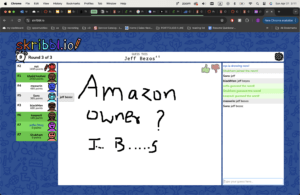Introduction
Skribbl.io is a free online multiplayer game that involves drawing and guessing developed by ticedev and published by algodextrous. Gameplay involves players taking turns to draw a word that is given to them while other players guess what the word is. Skribbl.io is a game that appeals to a broad audience, gamers and non-gamers alike, and can be played by 2-20 players. The specific age range for skribbl.io is not listed, but it is a family friendly game so I would expect it to accommodate players of ages 10+.
Central Argument
Judging in skribbl.io is highly dependent on successful guessing and consequent points earned, leading to a a competitive environment that isn’t conducive to positive group dynamics and relationships. This occurs due to the current game design decisions such as point-tracking, lack of moderation, the like/dislike feature, and in-game chatting feature.
Analysis
 In skribbl.io, the win conditions are simple. Whoever has the most points wins the game. Points can be earned either by drawing something that other players are able to guess correctly, or guessing a word correctly. Because of this main mechanism, the gameplay in turn heavily relies on the quality of drawing and success the person drawing has on aiding players to guess the word that they are trying to convey. This pressures players drawing to convey their word through alternate means such as writing key words or even partially or fully writing out the word, however, this defeats the purpose of the game, making it really easy to guess words correctly. Moreover, there is no moderation in this game so technically, players are free to write words out. Players drawing are incentivized to do this for various reasons. First of all, if other players are able to guess their drawing correctly, they win points. If guessers are able to correctly figure out the word, they also win points. It’s a win-win situation, and therefore there is more risk in trying to fully draw something out. But, it is this challenging aspect of guessing correctly that is the charm of guessing games like skribbl.io Additionally, guessers are able to express their approval or disapproval of drawings (through the thumbs up and thumps down buttons) and even kick out players from the game. These mechanisms could potentially motivate drawers to change their strategy, however, when I was playing I found that it discouraged me from trying to be more creative and clever with my drawings, and instead attempt to convey words through more straightforward methods. Instead of focusing on the fun and challenge of interpreting drawings skribbl.io’s UI instead encourages players to become more concerned with maximizing their points and winning the game.
In skribbl.io, the win conditions are simple. Whoever has the most points wins the game. Points can be earned either by drawing something that other players are able to guess correctly, or guessing a word correctly. Because of this main mechanism, the gameplay in turn heavily relies on the quality of drawing and success the person drawing has on aiding players to guess the word that they are trying to convey. This pressures players drawing to convey their word through alternate means such as writing key words or even partially or fully writing out the word, however, this defeats the purpose of the game, making it really easy to guess words correctly. Moreover, there is no moderation in this game so technically, players are free to write words out. Players drawing are incentivized to do this for various reasons. First of all, if other players are able to guess their drawing correctly, they win points. If guessers are able to correctly figure out the word, they also win points. It’s a win-win situation, and therefore there is more risk in trying to fully draw something out. But, it is this challenging aspect of guessing correctly that is the charm of guessing games like skribbl.io Additionally, guessers are able to express their approval or disapproval of drawings (through the thumbs up and thumps down buttons) and even kick out players from the game. These mechanisms could potentially motivate drawers to change their strategy, however, when I was playing I found that it discouraged me from trying to be more creative and clever with my drawings, and instead attempt to convey words through more straightforward methods. Instead of focusing on the fun and challenge of interpreting drawings skribbl.io’s UI instead encourages players to become more concerned with maximizing their points and winning the game.

Another limitation I noticed with skribbl.io is the chat feature. In the case of a public game, I understand how an in-chat messaging option is way safer. However, when playing with friends I find this typeof communication method to be very impersonal. Each round of drawings feels very boring since it’s hard to guess words in the chat while also trying to make funny side comments or chat with plain text. Additionally, being able to see failed word-guessing attempts in chat influences others guesses, and sometimes even makes it way too easy to guess the word based on other peoples’ mis-guesses. I think the addition of an in-game voice chat or even external voice chatting supplementations would make the experience of playing skribbl.io way more entertaining. Players would get the chance to talk about and make comments about the drawings they are seeing and express their emotions, whether its rage or joy, creating for a more dynamic immersive and social experience.


